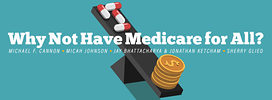Lead Essay
Michael F. Cannon finds many faults with Medicare for All, starting with the fact that it would reduce patient choice in ways that even citizens of Canada, the United Kingdom, and the Scandinavian countries do not experience. He rejects the idea that M4A would save money, and he describes the existing Medicare program’s history of failing to correct itself when it delivers inefficient and substandard care.
Response Essays
The health care status quo in the United States is nothing to be proud of, writes Sherry Glied. The U.S. response to COVID-19 in particular highlights the weaknesses of a system that is too expensive and that prioritizes the rich to an unacceptable degree. We face shortages of basic equipment that other countries do not, and this isn’t a failing limited to the pandemic. While she does not see Medicare for All as an especially good alternative, she concludes that it would nonetheless be much better than the status quo.
Writing with Jonathan Ketcham, Jay Bhattacharya explains how health care providers under Medicare face a series of perverse incentives—rewards, in essence, for inefficient and costly medical care. A system like this one can’t be expected to correct itself if and when the law makes it the only system around. Other countries’ socialized health care systems have also failed to deliver life expectancy or lower costs.
Micah Johnson disputes several of Michael Cannon’s empirical findings and argues that Medicare for All would indeed give all Americans a health care plan that was safe and affordable. Selling health insurance on the open market has failed to control prices; other countries, which use a variety of single-payer, government-administered systems, generally enjoy lower spending per capita and a higher standard of health than we do. He concludes that within a wide range of possible variants, any form of medicare for all would be closer to this appealing international norm.
The Conversation
Coming Up
Conversation through the end of the month.

